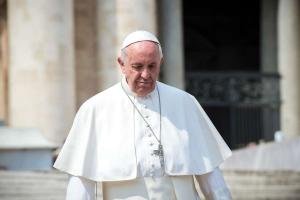Analysis: Serious and unserious allegations of papal heresy
FREE Catholic Classes
On April 30, a group of 19 Catholics released an open letter to the bishops of the world, accusing the pope of heresy and demanding that the college of bishops act to make him "adjure."

Highlights
Catholic Online (https://www.catholic.org)
5/3/2019 (5 years ago)
Published in U.S.
Keywords: Analysis, Serious and unserious, papal heresy
Washington D.C., (CNA) - According to the letter's signers, which include a handful of prominent academics, Pope Francis has committed the canonical crime of heresy, which entails publicly and obstinately doubting or denying credenda teachings - those Catholics are required, according to canon law "to believe with divine and Catholic faith."
But despite the letter's strident claims, the arguments advanced by its authors do not appear to make a legal, or consistent, argument against the Holy Father regarding the specific charge of canonical heresy.
Despite the insistence that the pope has committed the "canonical delict of heresy," the letter's authors appear unable to distinguish between the crime of heresy and what their letter actually appears to allege '" material heresy.
Material heresy describes a situation in which a person has, in word or deed, manifested an opinion in doubt of or contradiction to a truth to be believed by divine and Catholic faith. Such a situation should, of course, be corrected by the Church. But the "evidence" presented in the letter appears, to many initial critics, to amount to little more than inferences open to interpretation.
Committing the canonical crime of heresy requires the obstinate doubt or denial of a credenda teaching, and like any crime, has to be clearly manifested in the external forum and not merely inferred to be a person's inner disposition.
Legally, the criterion of obstinacy is demonstrated when a legitimate correction or warning is demonstrably rejected. The letter's authors insist that the pope's obstinacy '" or "pertinacity" as they prefer '" is demonstrated ipso facto by statements from the pope which he should, by his education experience and office, know better than to make.
The letter's most substantive theological critique of the pope centers on the well-known controversies over some of the language in the 2015 Synod on the Family and the subsequent apostolic exhortation Amoris laetitia. But the letter's authors take no account of the number of bishops and theologians, including the pope himself, who contend that Amoris can and should be read in continuity with Catholic teaching on marriage, sexuality and the family.
While the letter may be an honest expression of opinion by the 19 signers, few experts have concluded that it serves to demonstrate the obstinate manifestation of heretical beliefs by the pope in law or fact.
Similarly, in their treatment of the pope's signing of a declaration on interreligious cooperation in Abu Dhabi, which they also insist is heretical, the signers note that while the pope has offered both explanations and context for the document, "none of these explanations offers an unambiguous interpretation that is compatible with the Catholic faith.".
Canonists commenting on the letter, apart from the single canon lawyer to sign it, have agreed that this does not meet the standards of an obstinate, explicit and external rejection of credenda teaching.
There is no legal requirement that the pope offer the letter's signers an explanation of his behavior sufficient to meet their own standards, nor does canon law recognize the expression of their own concerns as a canonically meaningful warning.
Given the insistence of the letter that the pope is not only in material heresy, but guilty of the canonical delict, the apparent gap in legal understanding detracts significantly from the letter's gravity.
Other papal "actions that indicate a rejection of truths of the faith" proposed by the letter consist of a long list of individuals Francis is accused of promoting or associating with. Further supposedly "indicative" proof appears even more tenuous, with the shape of a liturgical staff once used by Francis termed a "satanic stang" by the letter.
If support for the letter's legal premise has been absent, its reception among theologians has largely been one of disappointment.
Though many have noted that some of the issues raised in it are ongoing sources of concern and confusion for Catholics that would certainly benefit from an unambiguous clarification by the pope, by grounding their complaints in the "canonical crime of heresy," the letters authors have been seen by many to work from a deeply flawed premise.
The attempt to yoke together serious issues, like the language of parts of Amoris Laetitia, with trivial complaints, like the shape of a staff in a liturgical procession, has largely been met with skepticism.
Many have observed that the letter's scatter-gun approach to topics as varied as theological language and episcopal appointments lessens the impact of its concerns, even as it attempts to amplify them.
For those with serious, even legitimate concerns about the clarity of teaching in some papal writings, this letter and its invocation of canonical heresy may prove to be an unwelcome distraction.
What is not disputed is that a formal public accusation of heresy against the pope by a group of Catholics, including clerics and academics associated with Catholic universities and institutions, cannot simply be ignored.
Whatever the document's intentions, it does seem to represent a direct and public appeal to the college of bishops against what is explicitly termed a criminal exercise of the papal teaching office.
While canon lawyers often debate the hypothetical possibility and legal repercussions of an heretical pope, the discussion of what may or should be done about the challenge to papal authority by the letter's authors may prove to be anything but theoretical.
---
'Help Give every Student and Teacher FREE resources for a world-class Moral Catholic Education'
Copyright 2021 - Distributed by Catholic Online
Join the Movement
When you sign up below, you don't just join an email list - you're joining an entire movement for Free world class Catholic education.

-

- Stations of the Cross
- Easter / Lent
- 5 Lenten Prayers
- Ash Wednesday
- Living Lent
- 7 Morning Prayers
- Mysteries of the Rosary
- Litany of the Bl. Virgin Mary
- Popular Saints
- Popular Prayers
- Female Saints
- Saint Feast Days by Month
- Pray the Rosary
He Is Risen: Embracing the Power of the Resurrection in a Weary World
Happy Easter: The Tomb is Empty! Love Has Triumphed
The surprising origins of the Easter Bunny — it’s not what you think!
Daily Catholic
 Daily Readings for Sunday, April 20, 2025
Daily Readings for Sunday, April 20, 2025St. Marian: Saint of the Day for Sunday, April 20, 2025
 Children's Prayer For Parents: Prayer of the Day for Sunday, April 20, 2025
Children's Prayer For Parents: Prayer of the Day for Sunday, April 20, 2025 Daily Readings for Saturday, April 19, 2025
Daily Readings for Saturday, April 19, 2025 St. Alphege: Saint of the Day for Saturday, April 19, 2025
St. Alphege: Saint of the Day for Saturday, April 19, 2025- Stewardship Prayer: Prayer of the Day for Saturday, April 19, 2025
![]()
Copyright 2025 Catholic Online. All materials contained on this site, whether written, audible or visual are the exclusive property of Catholic Online and are protected under U.S. and International copyright laws, © Copyright 2025 Catholic Online. Any unauthorized use, without prior written consent of Catholic Online is strictly forbidden and prohibited.
Catholic Online is a Project of Your Catholic Voice Foundation, a Not-for-Profit Corporation. Your Catholic Voice Foundation has been granted a recognition of tax exemption under Section 501(c)(3) of the Internal Revenue Code. Federal Tax Identification Number: 81-0596847. Your gift is tax-deductible as allowed by law.




 Daily Readings for Sunday, April 20, 2025
Daily Readings for Sunday, April 20, 2025 St. Marian: Saint of the Day for Sunday, April 20, 2025
St. Marian: Saint of the Day for Sunday, April 20, 2025 Children's Prayer For Parents: Prayer of the Day for Sunday, April 20, 2025
Children's Prayer For Parents: Prayer of the Day for Sunday, April 20, 2025 St. Alphege: Saint of the Day for Saturday, April 19, 2025
St. Alphege: Saint of the Day for Saturday, April 19, 2025

